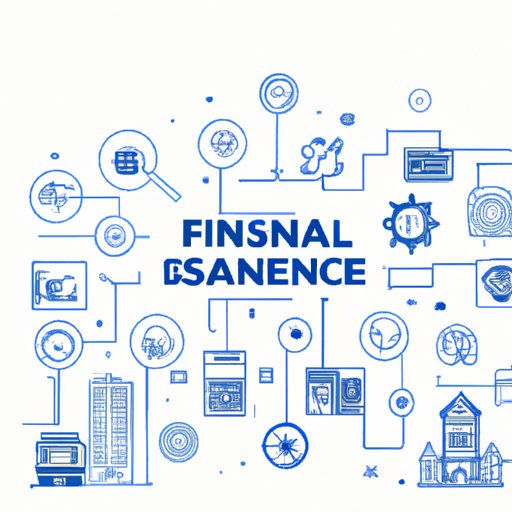Introduction
The financial services industry is a broad term used to describe the services provided by organizations in the finance sector. This includes banking, insurance, investments, securities, mortgages, credit cards, and more. In this article, we will explore the different types of financial services, regulations, and trends in the financial services industry. We will also examine the impact of financial technology (FinTech) on the industry.
An Overview of the Financial Services Industry
The financial services industry is composed of organizations that provide financial services and products to their customers. These services and products include banking, investment, insurance, and other related services. The industry is highly regulated, with different regulatory bodies overseeing different aspects of the industry. Due to its complexity and the need for compliance, the financial services industry has become increasingly reliant on technology.
Definition and Types of Financial Services
Financial services are services provided by organizations in the finance sector. These services include banking, investment, insurance, and other related services. Banking services include deposits, loans, and money transfers. Investment services involve the buying and selling of securities such as stocks, bonds, and mutual funds. Insurance services cover life, health, property, and casualty insurance.
Regulatory Bodies and Regulations
The financial services industry is heavily regulated by various government and non-government organizations. The primary regulator in the United States is the U.S. Securities and Exchange Commission (SEC), which is responsible for overseeing the securities markets. Other regulatory bodies include the Federal Deposit Insurance Corporation (FDIC), the Office of the Comptroller of the Currency (OCC), and the Consumer Financial Protection Bureau (CFPB). These organizations are responsible for enforcing laws and regulations designed to protect consumers and ensure the stability of the financial system.
Trends in the Financial Services Industry
The financial services industry has seen a number of changes over the years. One of the major trends is the increasing use of technology to improve customer service, reduce costs, and increase efficiency. Additionally, there has been an increased focus on compliance and regulation, as well as cybersecurity threats. There has also been an increased focus on customer experience and personalization.

Exploring Different Types of Financial Services
Let’s take a closer look at some of the different types of financial services available:
Banking Services
Banking services involve the taking and managing of deposits, granting of loans, and providing of money transfer services. Banks are often the first port of call for people seeking financial services, and they offer a wide range of services including checking and savings accounts, credit cards, and mortgages.
Investment Services
Investment services involve the buying and selling of securities such as stocks, bonds, and mutual funds. Investment banks provide advice to corporations and governments on mergers and acquisitions, capital raising, and other transactions. Brokerage firms provide access to the stock market for individual investors and manage their investments.
Insurance Services
Insurance services provide protection against loss or damage due to unforeseen events. Insurance companies provide life, health, property, and casualty insurance policies. They also provide annuities and other forms of retirement planning.

Examining Regulations and Trends in the Financial Services Industry
Now let’s take a look at the regulations and trends impacting the financial services industry.
Regulatory Bodies and Regulations
As mentioned earlier, the financial services industry is heavily regulated by various government and non-government organizations. These organizations are responsible for ensuring that the industry operates in a safe and fair manner. As part of their mandate, they impose regulations on the industry, such as restrictions on certain types of trading, capital requirements, and consumer protection laws.
Impact of Technological Advancement on the Financial Services Industry
Technology has had a significant impact on the financial services industry. Technology has enabled financial institutions to offer faster and more efficient services to their customers. Automation has allowed banks to process transactions quickly and securely. Additionally, technology has enabled the development of mobile banking apps and online banking platforms, allowing customers to easily access their accounts and manage their finances.

The Impact of Financial Technology on the Financial Services Industry
Financial technology, or FinTech, is the application of technology to the delivery of financial services. FinTech has revolutionized the financial services industry, offering new and innovative ways to deliver services and products. It has enabled the development of digital wallets, online payments, peer-to-peer lending, crowdfunding, and robo-advisors.
Overview of FinTech
FinTech has transformed the way financial services are delivered. It has enabled the development of innovative products and services, such as mobile banking apps, digital wallets, and robo-advisors. FinTech has also made it easier for customers to access financial services, with many providers offering services through digital channels. Additionally, FinTech has enabled the development of automated processes, such as machine learning algorithms, to help financial institutions make better decisions.
Benefits of FinTech
FinTech has enabled a number of benefits for both financial institutions and customers. For financial institutions, it has enabled them to reduce costs, increase efficiency, and offer more personalized services. For customers, it has enabled them to access financial services more easily, as well as to compare products and services from different providers.
Challenges of FinTech
Despite the numerous benefits of FinTech, there are some challenges associated with it. These include data privacy concerns, cyber security risks, and the potential for disruption of existing business models. Additionally, there is the risk of fraud and money laundering, as well as the potential for regulatory arbitrage.
An Analysis of Current Challenges Facing the Financial Services Industry
The financial services industry is facing a number of challenges. Let’s take a look at some of the current challenges facing the industry.
Challenges in Compliance and Regulation
One of the major challenges facing the financial services industry is the increasing complexity of regulations. With the introduction of new regulations, such as the European Union’s General Data Protection Regulation, financial institutions must ensure that they are compliant with the regulations. This requires them to invest in new technologies and processes to ensure compliance.
Cybersecurity Threats
Another challenge facing the financial services industry is the growing threat of cyber-attacks. With the proliferation of digital banking and payment systems, financial institutions must ensure that their systems are secure and resilient. This requires them to invest in strong cyber security measures, including encryption, authentication, and monitoring.
Growing Competition
The financial services industry is becoming increasingly competitive. With the emergence of new players, such as FinTech startups, traditional financial institutions must stay ahead of the competition. This requires them to continuously innovate and develop new products and services to stay ahead of the competition.
Conclusion
The financial services industry is a complex and ever-changing landscape. It is heavily regulated by various government and non-government organizations, and is subject to a number of trends and challenges. Financial technology has had a significant impact on the industry, enabling the development of innovative products and services. Despite the challenges, the industry is well-positioned to continue to serve its customers in the future.
(Note: Is this article not meeting your expectations? Do you have knowledge or insights to share? Unlock new opportunities and expand your reach by joining our authors team. Click Registration to join us and share your expertise with our readers.)
